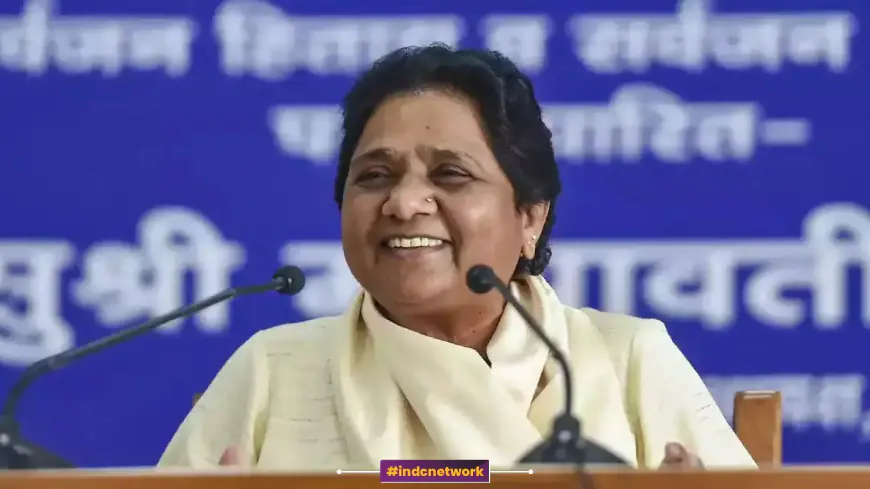Biography of Mayawati : The Rise, Challenges, and Legacy of Uttar Pradesh's First Dalit Chief Minister
Explore the life and political career of Mayawati, the former Chief Minister of Uttar Pradesh and a trailblazer for Dalit representation in Indian politics. From her early life in Delhi to her landmark electoral victories and the controversies that marked her tenure, this comprehensive article delves into her achievements, challenges, and lasting impact on the socio-political landscape of Uttar Pradesh.

INDC Network : Biography : Mayavati : The Life and Legacy of Mayawati: A Political Trailblazer in Uttar Pradesh
Mayawati, a prominent Indian politician and former Chief Minister of Uttar Pradesh, has had a remarkable and transformative impact on Indian politics. Born on January 15, 1956, in Delhi, Mayawati's journey from modest beginnings to becoming one of the most influential figures in Indian politics is both inspiring and complex. Her life story is a testament to her resilience, political acumen, and her unwavering commitment to the marginalized sections of society.
Early Life and Education : Mayawati was born into a family of modest means. Her father, Prabhu Das, was a retired employee of the Central Bank of India, and her mother, Ram Rati, was a housewife. Growing up in Delhi, she faced the challenges of poverty and social stigma, yet her family’s emphasis on education provided her with a path to a better future.
She pursued her education at Delhi University, where she completed her Bachelor’s degree in Arts from the Kalindi College. Later, she obtained a Master’s degree in Education from the University of Delhi. Mayawati’s academic achievements, particularly in a society where women’s education was often secondary, marked the beginning of her determination to overcome barriers and achieve significant milestones.
Entry into Politics : Mayawati's foray into politics was deeply influenced by the social and political climate of the time. Her initial involvement was with the Bahujan Samaj Party (BSP), a party founded by Kanshi Ram in 1984. The BSP was dedicated to representing the interests of the Scheduled Castes, Scheduled Tribes, and other marginalized groups in India. This alignment with social justice and empowerment resonated with Mayawati’s personal experiences and aspirations.
Mayawati’s rise in the BSP was swift. Her organizational skills, combined with her deep understanding of the socio-economic issues affecting marginalized communities, earned her a place in the party’s leadership. In 1989, she was elected as a Member of the Rajya Sabha, marking her first significant entry into mainstream politics.
Political Ascendancy : The real turning point in Mayawati’s career came in 1995 when she became the Chief Minister of Uttar Pradesh for the first time. Her ascent to this position was not just a personal victory but a historic moment for Indian politics. Mayawati’s leadership was notable for several reasons.
Firstly, she was the second Dalit woman to hold the office of Chief Minister in any Indian state. Her tenure was marked by a commitment to addressing the grievances of Dalits and other marginalized communities. She introduced policies aimed at improving educational opportunities, healthcare, and infrastructure in areas predominantly inhabited by these communities.
Mayawati’s governance was also marked by a focus on symbolic and infrastructural changes. Her administration undertook the construction of numerous statues and parks dedicated to prominent Dalit leaders, including the memorials for B.R. Ambedkar, the chief architect of the Indian Constitution and a major figure in the struggle for Dalit rights. These projects, while controversial, were seen as a means of empowering marginalized communities and instilling a sense of pride and identity.
Challenges and Controversies : Mayawati’s tenure was not without its challenges and controversies. Critics often accused her of focusing too heavily on personal and party symbolism rather than on substantive policy reforms. The extensive expenditure on statues and parks was a point of contention, with opponents arguing that these funds could have been better utilized for public welfare and infrastructure.
Additionally, her administration faced allegations of corruption and misuse of power. The CBI and other investigative agencies conducted probes into various charges, although Mayawati and her supporters often dismissed these as politically motivated attacks aimed at undermining her leadership.
Despite these controversies, Mayawati’s influence and popularity among her core constituency remained strong. Her ability to mobilize the Dalit vote and her effective political strategies helped her to secure successive terms as Chief Minister.
The 2007 Electoral Victory and Its Aftermath : The 2007 state assembly elections were a landmark event in Mayawati’s political career. The BSP achieved a landslide victory, securing a majority on its own, an unprecedented achievement for the party. This victory was seen as a testament to Mayawati’s effective leadership and her appeal to the electorate.
During her second term, she continued her focus on social justice and infrastructural development. Her administration worked on several projects aimed at improving the living conditions of the marginalized, including initiatives in education and healthcare. However, her tenure was also marked by continued allegations of corruption and administrative inefficiencies.
Decline and Challenges : Mayawati’s political influence began to wane in the later years of her career. The 2012 and 2017 state assembly elections did not yield the same level of success for the BSP as the 2007 elections had. The rise of new political forces, particularly the Bharatiya Janata Party (BJP) and the Samajwadi Party, posed significant challenges to her dominance in Uttar Pradesh.
The political landscape in Uttar Pradesh became increasingly competitive, and Mayawati faced difficulties in maintaining her party’s prominence amidst the evolving dynamics. Her attempts to forge alliances with other parties did not always yield the desired results, and the BSP struggled to regain its previous electoral success.
Legacy and Impact : Despite the challenges and controversies, Mayawati’s legacy is significant. Her tenure as Chief Minister marked a period of increased visibility and empowerment for Dalits and other marginalized communities. The policies and initiatives she implemented had a lasting impact on the social and political fabric of Uttar Pradesh.
Mayawati’s rise to political prominence challenged traditional socio-political norms and paved the way for greater representation of marginalized groups in Indian politics. Her ability to build a large and dedicated political base demonstrated her skill in grassroots mobilization and political strategy.
Moreover, her leadership highlighted the importance of addressing social inequities and the need for political representation of historically disadvantaged groups. Her tenure underscored the complex interplay between identity, politics, and governance in a diverse and dynamic democracy like India.
Conclusion : Mayawati’s journey from her early life in Delhi to becoming a prominent political leader in Uttar Pradesh is a story of perseverance, ambition, and strategic acumen. Her tenure as Chief Minister was marked by both significant achievements and controversies, reflecting the complexities of governance in a large and diverse state.
Her legacy, however, extends beyond the controversies and challenges. As one of the most prominent Dalit leaders in Indian politics, Mayawati’s contributions to social justice and political representation have left an indelible mark on the political landscape of Uttar Pradesh and India as a whole. Her life and career continue to be a subject of study and debate, embodying the dynamic and often contentious nature of Indian politics.
What's Your Reaction?












































































































































































